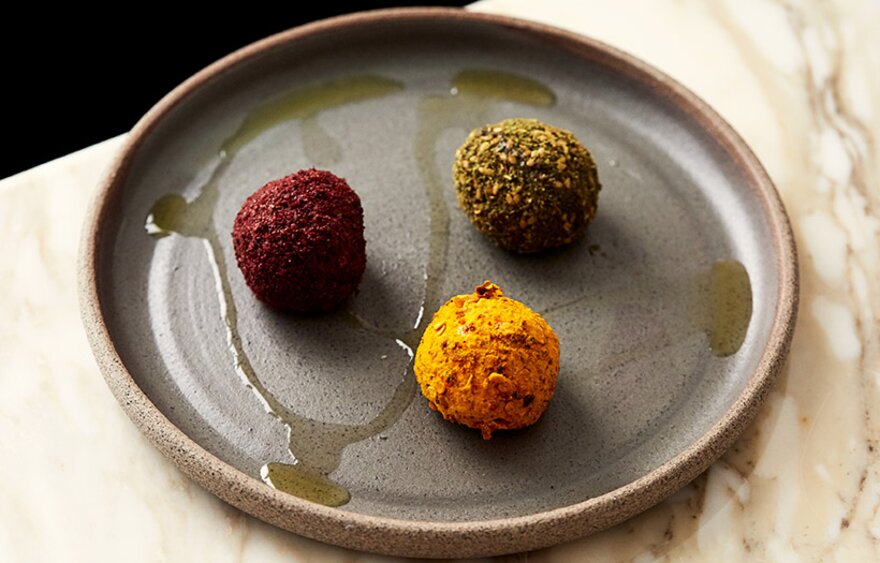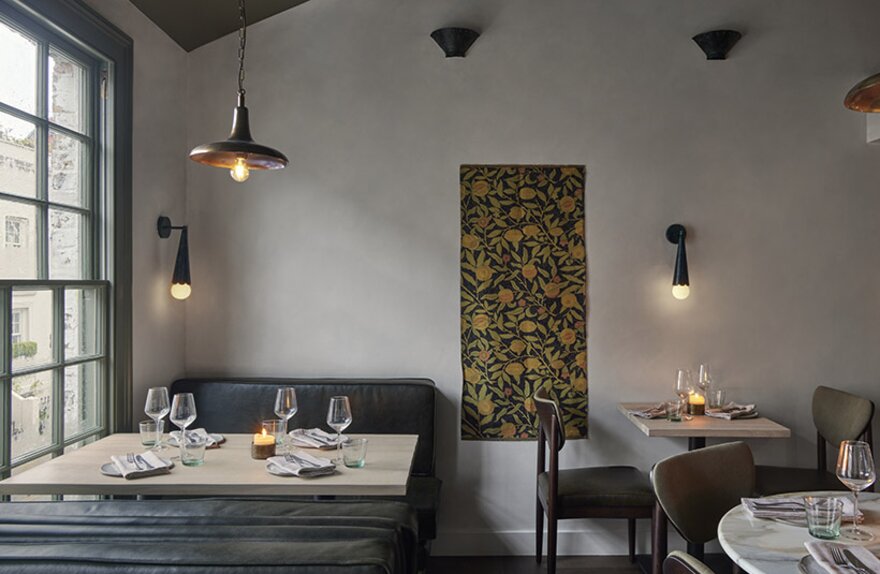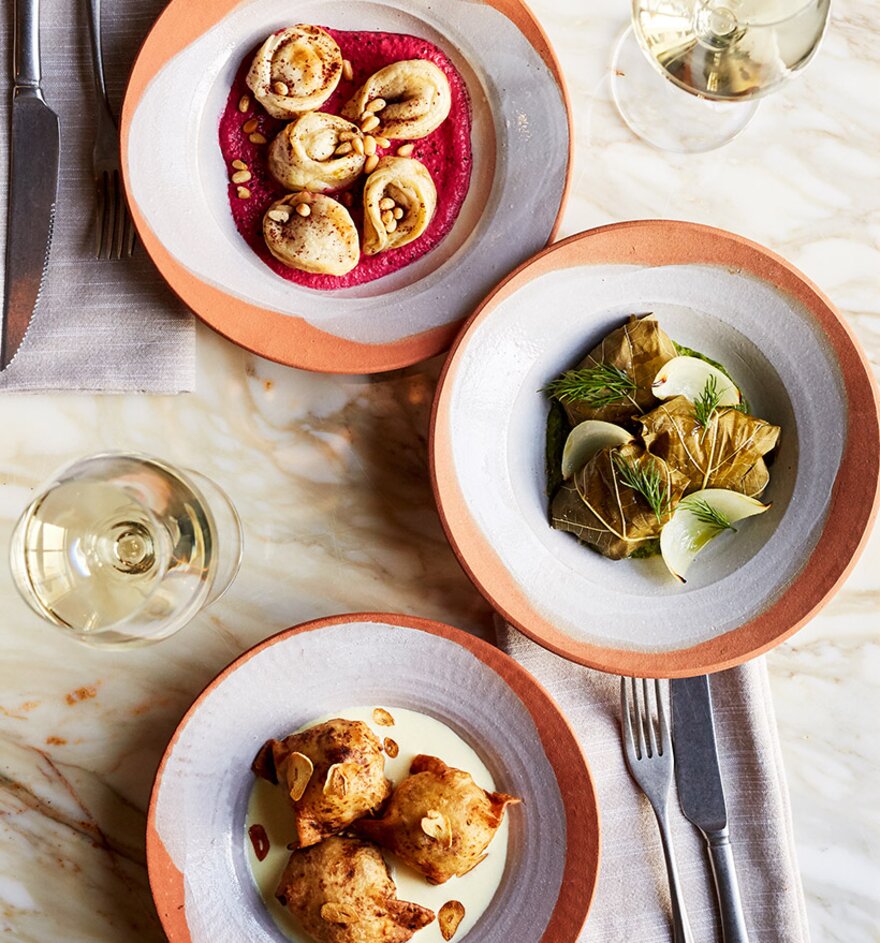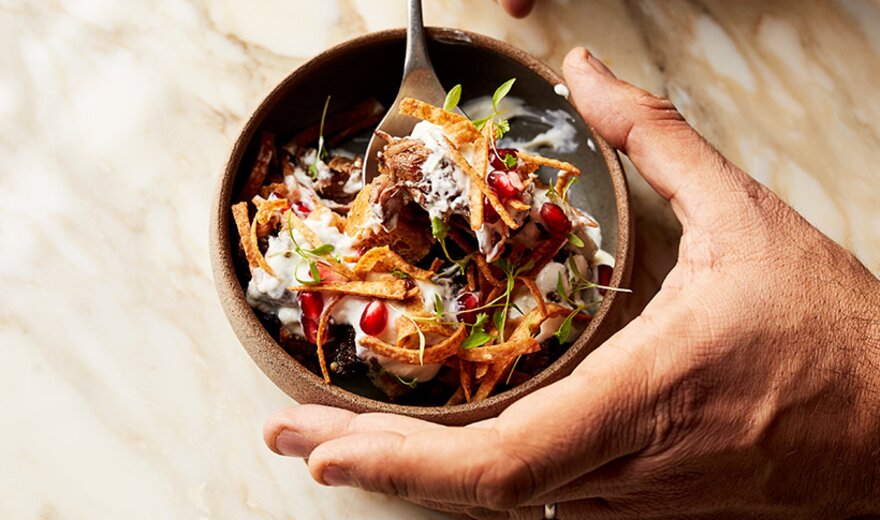Fadi Kattan is bringing Palestinian home cooking to London with Akub, where tradition is respected but influences are abundant – along with the correct type of hummus. Caroline Baldwin reports
Palestinian chef Fadi Kattan takes inspiration for dishes served at his Notting Hill restaurant from his grandmother's and mother's kitchens. "I still call my mother every day to ask for recipes and she loves saying: ‘so you're going to deconstruct that one now?'" laughs Kattan. "But the inspiration is really from them – my mother is a fantastic cook. She and my late grandmother not only cooked for us at home, they entertained a lot."
Kattan grew up in Bethlehem and spent family holidays in France and Switzerland before living in London and studying hotel management at the Institut Vatel in France. In 2015 he opened modern Palestinian restaurant Fawda – Arabic for "chaos", as he says, "creation comes from chaos" – in Bethlehem. His Notting Hill restaurant Akub followed late last year after two sell-out residencies at Carousel in the West End.
The situation in Palestine greatly influences his cooking, as well as, of course, his mother's and grandmother's recipes. Take his nigella seed crackers. "They're a pure invention of mine," he explains, "but the nigella taste is so essential in Palestinian cooking and it's about having that flavour and playing around with texture and flavour in a way that modernises it, but at the same time doesn't discount the original."
A man for all seasons
Many influences have impacted Kattan's cooking style, but he detests the word fusion, and his dishes are far from that. Instead, they are modern interpretations of classic home comfort dishes with a slight twist, such as the red lentil moutabal. Moutabal is traditionally made from aubergines and tahinia, served in a similar way to hummus (made from chickpeas and tahinia), for scooping with Arabic bread.
"In generic terms when it comes to the understanding of Middle Eastern cooking, people seem to know hummus, which has declined into a million versions of horrible things that are not hummus," he says.
Kattan explains that the word ‘hummus' in Arabic means ‘chickpeas', while ‘moutabal' translates to ‘seasoned'. "The real name for hummus is actually ‘hummus moutabal bil tahinia', which translates to ‘hummus seasoned with tahinia'," he says.
"So when I see menus with things like beetroot hummus, my hair stands up and I get goosebumps, because that's not true. If it was beetroot moutabal that's fine, that just means seasoned beetroot. The next question is whether it's a dip or not, because if you eat hummus in the traditional way you scoop it up with bread, but it's become fashionable at cocktail parties to serve hummus with carrot and cucumber sticks for dipping – and that's a very different experience in your mouth."
When looking to create his moutabal dish at Akub he decided on something that, while not traditional, was made from an ingredient that is essential within Palestinian cuisine – red lentils, which he mashes and seasons with tahinia and cumin. This misinterpretation of Middle Eastern food is all too common, explains Kattan, which is why he avoids using the phrase. Using the term ‘Middle Eastern', is like referring to ‘Northern European' as a cuisine – it's just too wide a region to encapsulate one cuisine.
"Or even the term ‘Mediterranean'," he continues. "The Mediterranean to me, geographically starts in Gibraltar and finishes with [Palestine] because we're at the end of the Mediterranean sea. But if you're on the port of Marseille you're going to get a fantastic bouillabaisse, which is a completely different cuisine to what is served [here]. There are similarities across the region, of course, but take olive oil – even that is different in Spain, Italy, Turkey, Greece or Palestine – not only because the land is different, but the olives have different exposure to the sun and the breeds of olives are different, but so are the traditions when making the oil."
Kattan says Palestinians pick their olives and leave them for 24 hours before pressing to allow them to oxidise for longer. "But that would have an Italian howling that you're committing a crime," he says. "I pick the olives from my own trees and press them within four hours, like the Italians, because I think that gives me a fantastic olive oil, but I've had local people taste it and say ‘what is this rubbish?', because taste is acquired.
"But it's about celebrating those traditions and the inheritance of how our palates were shaped. And what is great about London is that people are so curious about cuisines and their palates are open to experience – I see it with our guests when people come in to try Palestinian food for the first time. We guide them through the menu and they say ‘this tastes totally strange and we love it', or ‘this feels totally familiar, but we've never had it quite like this'."
He points to his dagga Ghazzawieh dish, a Gazan salad made with winter tomatoes, dill, garlic, a little chilli, olive oil and lemon. "You think it's very basic, but it's not. People often haven't bitten into a dill seed before and they are surprised by the explosion of flavour from what is visually a tomato salad."
Against the grain
Another dish that celebrates Palestinian tradition and heritage is maftool salad. Traditionally the grains are served in a stew with meat or chickpeas and sometimes tomatoes, but at Akub Kattan serves the grains as a salad with roasted radishes, carrots, onion and a light sumac vinaigrette.
"Maftool are hand-rolled wheat grains, but they are not cous cous," he is quick to point out. "They are way bigger than cous cous and I despise the appellation of maftool being called ‘Palestinian cous cous' because it's not. Cous cous is a different thing, and I think today it's essential that we acknowledge provenance and tradition."
Kattan imports these traditional grains from a woman's co-operative in Jenin in the north of the West Bank. "For me, when people say it's cous cous, they're discounting centuries of knowledge of those women who hand-roll literally every grain."
For this reason, Kattan imports all his dried produce from Palestine. "I haven't found anybody in the UK who can hand-roll maftool, but it's also important for me as a chef to have social responsibility and to celebrate those traditions of the maftool and the freekeh coming from co-operatives in Palestine that are inscribed into the local community."
Fresh produce is sourced from the UK, such as the yogurt he uses to make Nabulsi cheese, which is known in the Arabic world because it comes from the city of Nablus. The only fresh ingredient he imports is aubergines.
"At the end of the day, what do we chefs do? We take produce, whether it's fresh or dried, and transform it, but it's that respect and knowledge that has to be celebrated," he says.
While Kattan's first restaurant was named after chaos, his London restaurant, Akub, is named after the Arabic word for cardoon, an edible thistle that is notoriously difficult to prepare due to its thorny skin. But diners at Akub can easily find themselves falling into Kattan's thoughtful menu of Palestinian dishes.
Even his mother doesn't mind so much any more, after being presented with Kattan's take on her vine leaves. Traditionally they are stuffed with minced lamb patties called kufta, but he uses skate instead.
"She smiled at me and said: ‘you dare do this to your favourite dish as a kid?' But when she had a bite she admitted that they were actually really good!"
From the menu
Khobez (bread)
- Nigella seed crackers £3
- Spiced focaccia £3
Nakrooshat (snacks)
- Turmous – salted lupin beans £3
- Akub pickles – turnip, cauliflower, chilies and cucumber £4
Ard (land)
- Labaneh – homemade labaneh balls rolled in sumac, zaatar, turmeric and Aleppo pepper £6
- Dagga Ghazzawieh – winter tomatoes, green chilli, dill, garlic, lemon £8
- Maftool salad – Palestinian hand-rolled wheat, root vegetables, mint £9
- Red lentil moutabal – red lentils,tahinia, cumin £7
Bahar (sea)
- Arak-cured gurnard – gurnard fish, arak, olive oil, sumac £14
- Fish kofta bil warak – Rye Bay skate, loumi, grape leaves, coriander, tahinia £21
Lahmeh (meat)
- Crunchy mansaf – rice, pulled lamb shoulder, laban jamee, shrak, garlic £21
- Short rib fatteh – slow-cooked beef, garlic yogurt, pomegranate, foccacia £25
Short rib fatteh
Preparation time: 30 minutes
Cooking time: 3 hours
Marination time: 6 hours
Serves 4
- 1kg beef short-rib
- 2tbs olive oil
- 1tsp salt (coarse salt)
- ½tsp ground allspice
- ¼tsp ground cardamom
- ¼tsp ground black pepper
- ¼tsp ground coriander
- ¼tsp ground nutmeg
- ¼tsp ground cinnamon
- ¼tsp ground cumin
- 1 onion (peeled and cut into quarters)
- 2 garlic cloves (peeled)
- 1 bay leaf
- 2 garlic cloves
- ½tsp salt
- 200g Greek yogurt
- 2 x 55g Kmaj bread (pita)
- 1tbs olive oil plus 1tsp olive oil
- 20-30g pomegranate seeds
- Microgreens of your liking
Marinate the short ribs with the spices, salt and olive oil at least six hours.
Preheat the oven at 160°C. Heat a skillet and sear the short ribs on all sides.
In a roasting tin, place the short ribs, the onion, the garlic and the bay leaf. Add two cups of water, cover with aluminium foil and place in the oven for three hours. Check midway through and if necessary add some more warm water.
Remove the meat from the broth and set aside to rest. Strain the broth into a pan and place over a medium heat to reduce. Using two forks or a pair of tongs, pull the meat off the bones in large chunks.
In a mortar and pestle, crush the garlic with the salt and then incorporate the yogurt.
Slice one pita bread into thin strips. In a small pan, heat the tablespoon of olive oil and fry the pita strips until crispy. Drain over kitchen paper.
Place the pulled meat into the hot reduced broth and bring back to heat if necessary.
Line the bottom of a bowl with the pita that was not crisped and shred roughly with your fingers. Spoon the meat with a bit of the sauce over it, covering the whole bowl. Spoon the yogurt garlic sauce on top. Sprinkle the crispy bread on top, then the pomegranate seeds, some microgreens and finally drizzle over the ½tsp of olive oil.
Continue reading
You need to be a premium member to view this. Subscribe from just 99p per week.
Already subscribed? Log In













